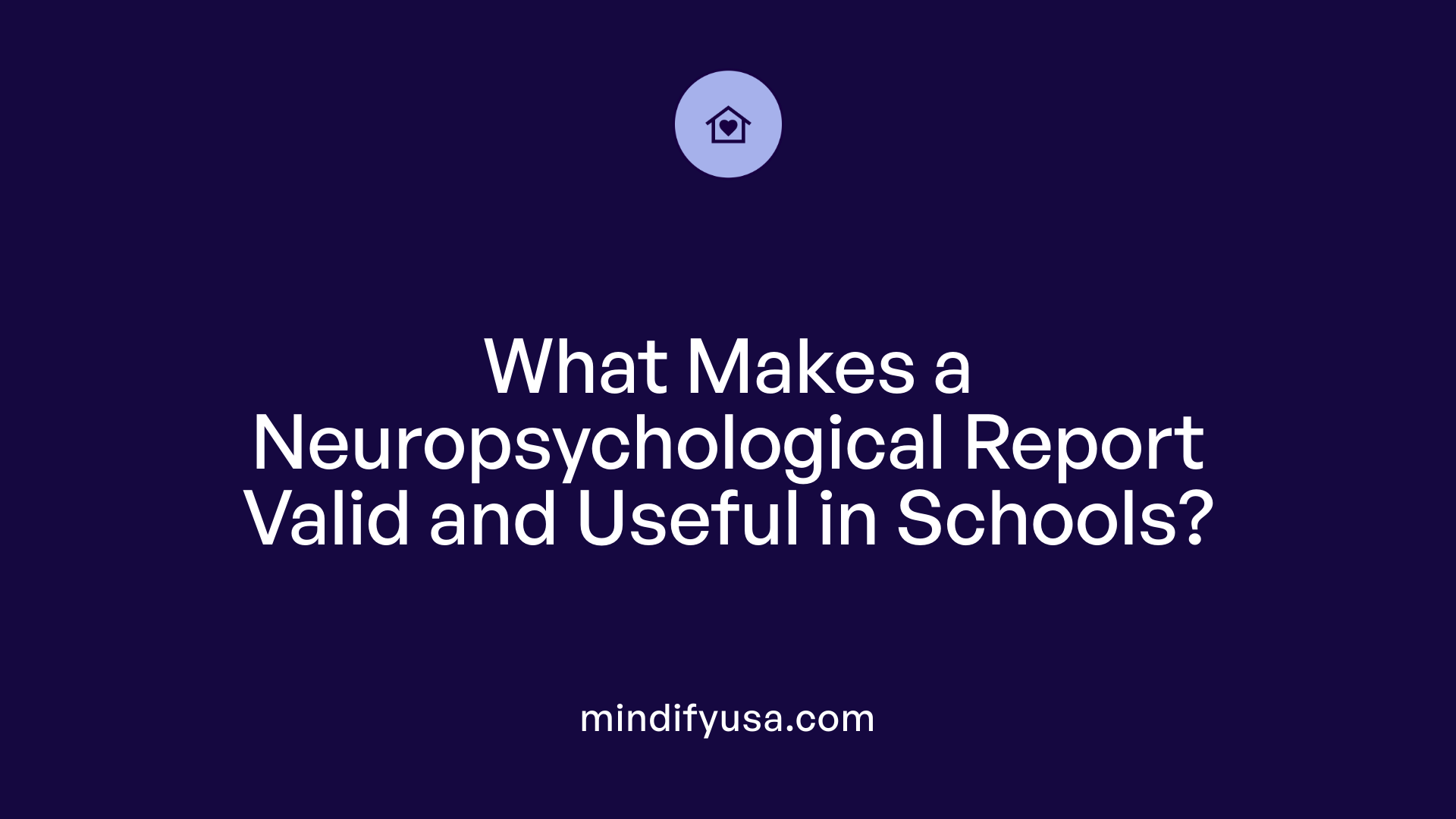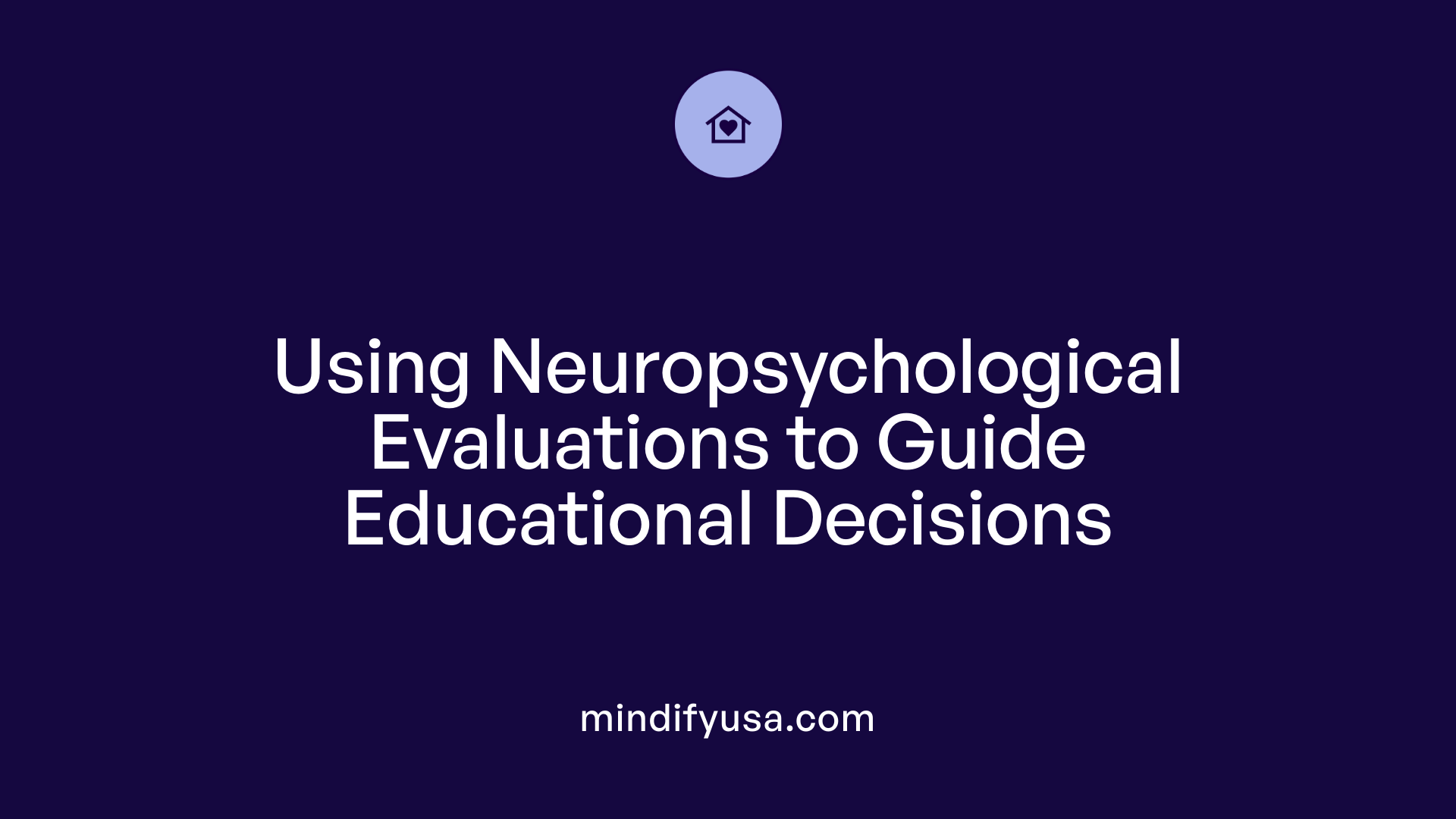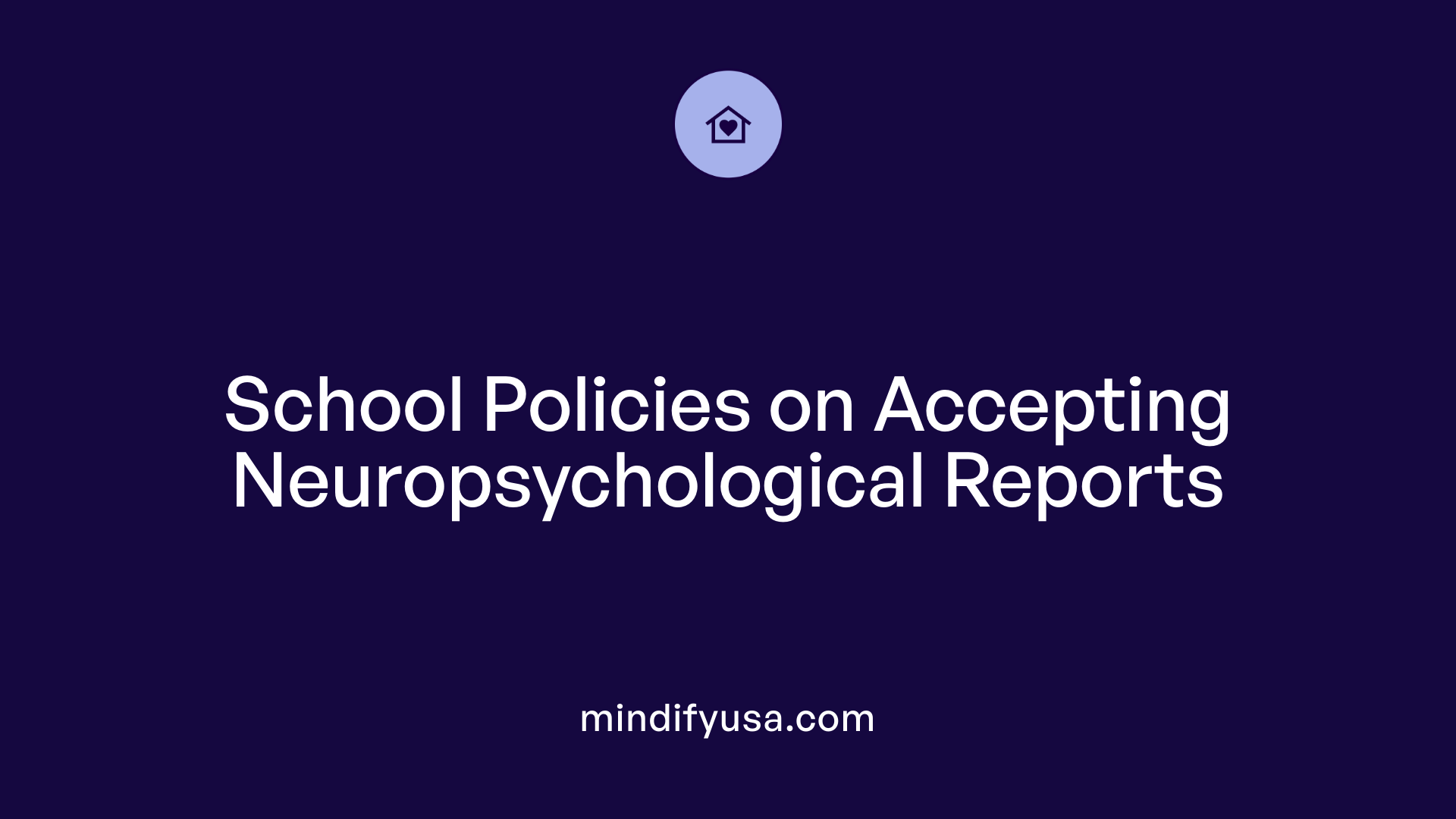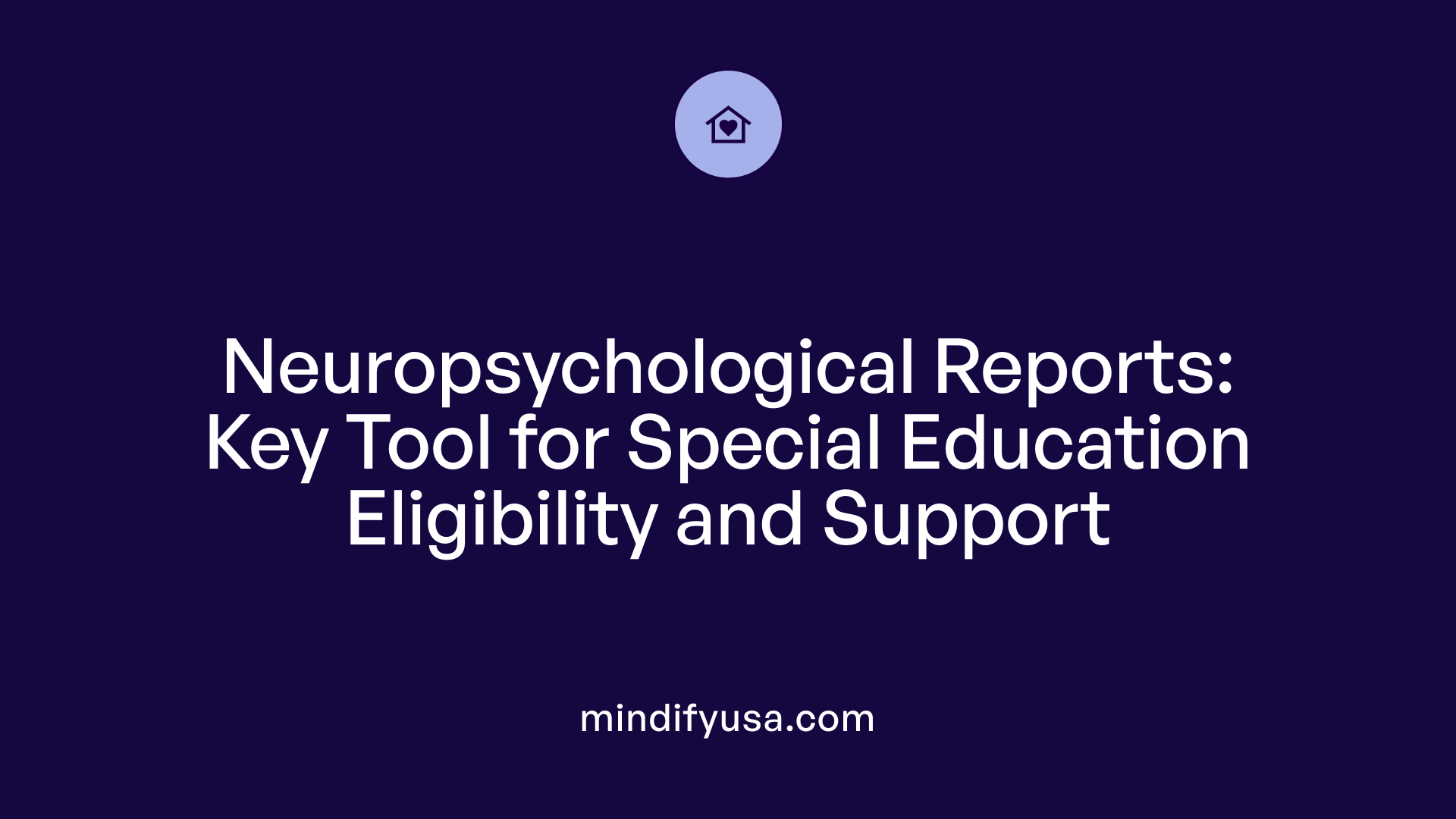Introduction to Neuropsychological Evaluations in Schools
Neuropsychological reports are comprehensive assessments that evaluate brain functioning and cognitive abilities. As educational institutions strive to meet diverse student needs, questions arise regarding the acceptance and use of these reports for support and accommodations. This article explores how neuropsychological evaluations are viewed by schools, their role in eligibility and intervention, and policies guiding their acceptance.
Acceptance of Neuropsychological Reports by Schools

Are neuropsychological reports accepted by schools for educational accommodations and support?
Yes, neuropsychological reports are widely recognized and accepted by schools when it comes to determining eligibility for special education services and planning necessary accommodations. These detailed assessments offer a comprehensive view of a child's cognitive strengths and weaknesses, providing valuable insights for educators and support staff.
While schools often conduct their own evaluations, private neuropsychological assessments can supplement these findings, especially when additional clarity or validation is needed. Schools typically accept reports from qualified neuropsychologists—those holding a doctoral degree, licensed, and with specialized training—as valid evidence for support decisions.
However, the acceptance of these reports can depend on their quality and how well they conform to educational standards. Well-prepared reports that include standardized testing, thorough background information, and practical recommendations are more likely to be influential. They can directly inform decisions on individualized education programs (IEPs), accommodations, and other support mechanisms.
Research has improved the way neuropsychological data are standardized, which enhances their utility for educational purposes. For example, using reading ability measures from tests like the WRAT-3 to benchmark scores helps in accurately identifying neurocognitive impairments across diverse populations, including African American students. This refinement allows schools to better understand whether observed deficits are due to underlying neuropsychological issues or disparities in educational quality.
In summary, when prepared by qualified professionals and aligned with educational standards, neuropsychological reports are a valuable tool for schools to develop effective, tailored support plans, ensuring students receive the help they need to succeed academically.
Utilization of Neuropsychological Evaluations in School Settings

Do schools recognize and use neuropsychological evaluations in their assessment and planning processes?
Many educational institutions recognize the significance of neuropsychological evaluations as comprehensive tools to understand a child's cognitive and emotional profile. These assessments are typically carried out by licensed psychologists specializing in neuropsychology, who evaluate various mental functions such as attention, memory, reasoning, language, and emotional regulation.
Unlike standard psychoeducational assessments, neuropsychological evaluations delve deeper into different domains, providing detailed insights that are especially useful for diagnosing conditions like ADHD, learning disabilities, autism spectrum disorder, and emotional or neurological issues.
School districts often rely on these evaluations to determine eligibility for special education services, though their scope might be narrower compared to private neuropsychological reports. Nonetheless, the information gleaned from these assessments directly influences the development of personalized interventions, accommodations, and support systems designed to meet each student's unique needs.
However, access to such evaluations can be limited due to high costs, availability of qualified professionals, and administrative barriers. While many schools consider outside neuropsychological reports when designing educational plans, not all conduct or heavily depend on these evaluations for their decision-making processes. Overall, neuropsychological assessments are crucial in shaping effective educational support, particularly for students with complex learning and behavioral challenges.
Policies and Practices on Neuropsychological Report Acceptance

What is the policy or practice regarding the acceptance of neuropsychological reports by educational institutions?
Educational institutions generally recognize neuropsychological reports when they are recent, detailed, and prepared by licensed professionals such as neuropsychologists. These reports are considered valuable sources of comprehensive information about a child's cognitive, emotional, and developmental functioning.
School districts often evaluate the relevance and accuracy of the reports to determine their usefulness in making educational decisions. When a neuropsychological report is used for evaluating a child's eligibility for special education services, schools look for assessments that meet federal and state standards, including proper documentation of testing procedures and qualifications of the evaluator.
In Massachusetts, the law mandates that evaluations—including neuropsychological assessments—must be conducted by qualified professionals following specified standards. The evaluations are reviewed by a multidisciplinary team to ensure they meet the criteria for eligibility and appropriate interventions.
Parents have the right to request an independent neuropsychological evaluation at public expense if they believe the school's assessment is insufficient or incomplete. These independent assessments are usually accepted by schools if conducted by qualified evaluators and can be instrumental in guiding educational planning.
Overall, neuropsychological reports deeply influence educational planning, especially when it comes to understanding complex learning needs involving attention, memory, executive functioning, and reasoning skills. Properly prepared reports help schools develop tailored supports, accommodations, and intervention strategies.
Using Neuropsychological Reports for Special Education Eligibility and Interventions

Can neuropsychological reports be used for special education eligibility and intervention in schools?
Yes, neuropsychological reports are vital tools in identifying and supporting students who require special education services. These detailed assessments offer a comprehensive view of a child's cognitive functioning, including language skills, memory, attention, executive functions, and emotional health.
School districts often rely on such reports to determine if a student qualifies for eligibility under federal law, particularly under the Individuals with Disabilities Education Act (IDEA). Unlike typical school evaluations, neuropsychological assessments provide in-depth data that help distinguish learning disabilities from other conditions, such as ADHD or autism spectrum disorders.
The information gathered guides educators and specialists in creating individualized education plans (IEPs) tailored to the child's unique needs. These plans include specific accommodations, modifications, and intervention strategies to promote academic success.
Furthermore, neuropsychological reports support legal and educational decisions, ensuring students receive appropriate support based on their neurological profiles. They also assist in developing targeted interventions that address underlying cognitive challenges, rather than just academic symptoms.
Overall, these assessments play a crucial role in advocating for students' rights to equitable education and effective support systems.
Educational Decision-Making and the Value of Neuropsychological Data
How do schools view and consider neuropsychological evaluations in their decision-making for student support?
Schools regard neuropsychological evaluations as a highly valuable resource that provides in-depth insights into a child's cognitive, behavioral, and emotional functioning. These assessments offer a comprehensive view of a student’s abilities across many areas, including memory, language, attention, and executive functioning.
Such detailed information greatly assists educators in understanding a child's individual needs and in planning appropriate interventions, supports, or accommodations. Neuropsychological reports are often used to determine eligibility for special education services and to inform the development of tailored educational plans such as Individualized Education Programs (IEPs).
When students display signs of learning difficulties, attention issues, or behavioral challenges that standard tests do not fully explain, these evaluations become critical tools for educators. They help move beyond observable symptoms to explore underlying cognitive and neurological factors.
Overall, schools see neuropsychological data as credible and essential for creating effective support strategies. Incorporating these evaluations into the decision-making process helps ensure that each child's educational experience is aligned with their specific brain-behavior profile, ultimately aiming to optimize learning outcomes and student well-being.
Validity and Cultural Considerations of Neuropsychological Reports
Are neuropsychological reports considered valid and credible by educational systems?
Neuropsychological reports prepared by licensed psychologists are widely accepted as trustworthy sources of information for educational planning and support. These evaluations provide detailed insights into a child's cognitive strengths and weaknesses, aiding in diagnosing conditions and developing targeted interventions.
However, the accuracy of these reports can depend on how well they account for individual differences, including cultural and educational backgrounds. Traditional assessments often adjust results solely based on years of education, which can be misleading. For example, among African American populations, such adjustments may not adequately reflect actual reading ability or the quality of education received, leading to potential misinterpretations.
To enhance validity, many assessments incorporate reading-based measures, such as the Wide Range Achievement Test (WRAT-3) reading score. This approach helps clinicians better understand a child’s academic skills relative to their potential, reducing the risk of misdiagnosis or inappropriate educational placement.
In summary, neuropsychological evaluations are credible and valuable tools when conducted with culturally sensitive assessment techniques. Proper interpretation within educational contexts ensures that students receive appropriately tailored supports and services, acknowledging individual diversity.
Final Thoughts on Neuropsychological Reports in Schools
Neuropsychological reports are integral tools in educational decision-making, providing in-depth insights into a child's cognitive and emotional functioning. While acceptance varies among schools, these evaluations are generally considered valid and play a vital role in shaping individualized support plans. As policies evolve and assessment techniques become more refined, the importance of these reports is likely to grow, ensuring that all students receive equitable and appropriate educational opportunities.
References
- "Neuropsych" evaluations are key for accessing special education ...
- 1282.00 Neuropsychological Evaluations Policy
- School District vs Neuropsychological Evaluations: A Guide for ...
- Neuropsychological Testing: What It Is, Purpose & Procedure
- Psychoeducational and Neuropsychological Evaluations Explained
- The Independent Educational Evaluation (IEE)
- Neuropsychological and Educational Testing: Seeking Help Without ...






































































































